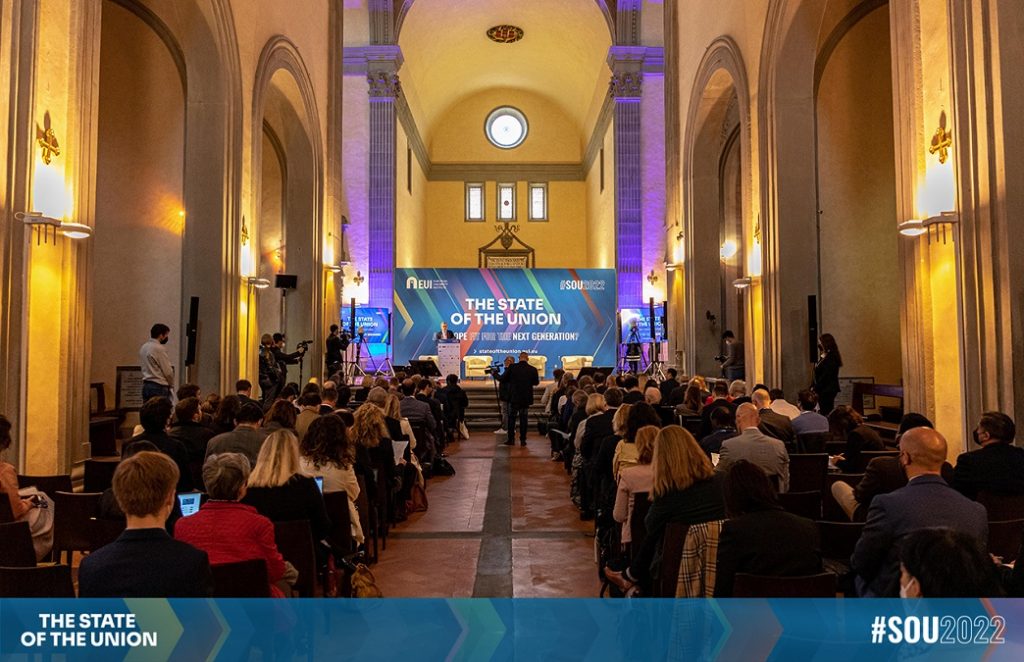The first day (5 May 2022) of the 12th edition of The State of The Union conference gathered policymakers, academics and private sector representatives in Florence to discuss ‘A Europe Fit for the Next Generation?’
The theme of this year’s edition “is an invitation for everyone to adopt a long-term perspective in their thinking about the problems we face,” said Professor Renaud Dehousse, President of the European University Institute, during the event’s opening session.

Subscribe to our Telegram channel to get a daily dose of business and lifestyle news from NHA – News Hub Asia!
Quoting John Adams, the second US President, who said ‘Facts are stubborn things’, Dehousse stressed that “our task as a knowledge producer is to identify those ‘stubborn things’ and remind our interlocutors that no matter what they will have to be addressed.”
Speakers did just this, addressing the post-pandemic recovery, climate change, the energy transition and the war in Ukraine, among other topics, and reflecting on the crucial question: Are we fit for the next generation?
“Yes, we have all of the elements, all of the instruments, all of the intelligence,” said Vincenzo Amendola, Italian Under-Secretary of State for European Affairs.
Noting that Europe has been “united, brave, and effective over the past three years”, Amendola stressed that Europe needs to focus on furthering integration.
“Unity is our today, it is what helped us to bring the European continent out of the biggest crisis. Unity is the cornerstone to achieve peace and negotiations all over the continent, but the ‘united states of Europe’ is our tomorrow and we have to pursue, we have to work, we have to analyse, we have to be united to change our integration process.”
In a session analysing whether the Ukraine crisis will weaken Europe’s climate and energy policy, Petra De Sutter, Belgian Deputy Prime Minister said while member states are adjusting their climate and energy goals, “it is an opportunity also to accelerate towards independence. We all need to move from Russian gas and oil towards renewables.”
When asked about what the EU can do to address the issue of member states being impacted differently by the immediate energy crisis, De Sutter said, “We have to take into account that some member states will have more difficulties (…) so there must be mechanisms that play on solidarity, financial mechanisms, also mechanisms that look at the people.”
In a session on achieving Europe’s great energy challenge, Fatih Birol, Executive Director of the International Energy Agency (IEA) said that we are in a “new energy world”, one that opens the door to opportunity. “The world is facing its first truly global energy crisis. There are huge risks that the global energy markets are facing today but I also believe that there is a realistic chance to make this a historic turning point towards a cleaner and more secure energy system.”
In the same session, Teresa Ribera Rodríguez, Spanish Deputy Prime Minister and Minister for the Ecological Transition, shared this optimism, “We need to stress unity, we need to stress solidarity, we need to stress a much bigger cooperation and these are things that are important in the construction of the European project and I think there is an opportunity to do much more because of this crisis.”
On day one, approximately 300 people participated in the conference in person and more than 5,000 participated online.
The State of the Union continues on Friday, 6 May from 9:00 CEST from Palazzo Vecchio in Florence. Day two speakers include European Parliament President Josep Borrell-Fontelles, European Parliament President Roberta Metsola and WHO Director-General Tedros Adhanom Ghebreyesus.

